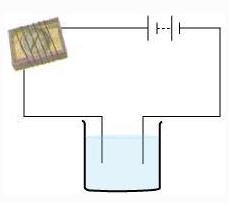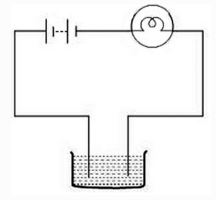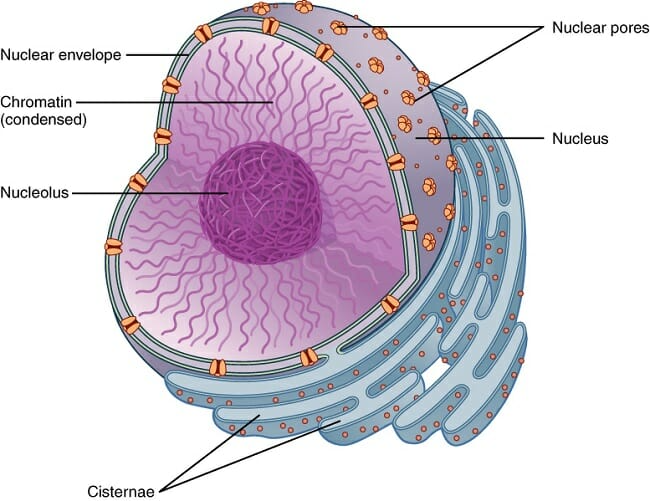Class 8 - Science
Chapter 14 - Chemical Effects of Electric Current

Top Block 1
Question :1. Fill the blanks.
(a) Most liquids that conduct electricity are solutions of —————, ————— and —————.
(b) The passage of an electric current through a solution causes —————— effects.
(c) If you pass current through copper sulphate solution, copper gets deposited on the plate connected to the —————— terminal of the battery.
(d) The process of depositing a layer of any desired metal on another material by means of electricity is called ——————.
Answer :
Fill the blanks.
(a) Most liquids that conduct electricity are solutions of acids, bases and salts.
(b) The passage of an electric current through a solution causes chemical effects.
(c) If you pass current through copper sulphate solution, copper gets deposited on the plate connected to the negative terminal of the battery.
(d) The process of depositing a layer of any desired metal on another material by means of electricity is called electroplating.
Question :2. When the free ends of a tester are dipped into a solution, the magnetic needle shows deflection. Can you explain the reason?
Answer :
Yes, it is because the solution conducts electricity and solution plays the rule of cell.
Question :3. Name three liquids, which when tested in the manner shown in Fig.14.9 may cause the magnetic needle to deflect.

Answer :
It may be the salt solution in water.
Question :4. The bulb does not glow in the setup shown in fig. 14.1. List the possible reasons. Explain your answer.

Mddle block 1
Answer :
The possible reasons are:
(i) The solution may be conducting electricity but the current produced it too small, so that the filament of the bulb does not get heated and the bulb does not glow.
(ii) It is possible that the connections are loose.
(iii) The cells are used up.
Question :5. A tester is used to check the conduction of electricity through two liquids. Labelled A and B. it is found that the bulb of the tester glows brightly for liquid A while it glows very dimly for liquid B. you would conclude that
(i) Liquid A is a better conductor than liquid B
(ii) Liquid B is a better conductor than liquid A
(iii) Both liquids are equally conducting
(iv) Conducting properties of liquid cannot be compared in this manner.
Answer :
(i) Liquid A is better conductor than liquid B.
Question :6. Does pure water conduct electricity? If not, what can we do to make it conducting?
Answer :
No. Pure water does not conduct electricity. This is because pure water is devoid of any salts. Pure water can conduct electricity when a pinch of common salt is added to it, as salt solution is conducting in nature.
Question :7. In case of fire, before the firemen use the water hoses, they shut off the main electric supply for the area. Explain why they do this.
Answer :
Water may conduct electricity. If the electrical supply for the area is not shut off and water is poured over electrical appliances, then electricity may pass through water and harm the firemen. That is why, in case of a fire, the firemen shut off the main electrical supply for the area before they use the water hoses.
Question :8. A child staying in a coastal region tests the drinking water and also the seawater with his tester. He finds that the compass needle deflects more in the case of seawater. Can you explain the reason?
Answer :
The water used to extinguish fire, have lot of minerals and dissolved salt, which make it conducting. Before throwing water into the burning houses and the mains of electricity of the area is shut off because then the water may conduct huge current and firemen get electric shock.
Question :9. Is it safe for the electrician to carry out electrical repairs outdoors during heavy rain pour? Explain.
Answer :
The impure water is conductor of electricity. Sea water contains more impurity than drinking water found in the coastal region. Therefore, sea water conducts more electricity than drinking water. That is why, compass needle deflects more in case of sea water.
Question :10. Paheli had heard that rainwater is as good as distilled water. So, she collected some rainwater in a clean glass tumbler and tested it using a tester. To her surprise she found that the compass needle showed deflection. What could be the reason?
Answer :
When it rain heavily, the rain water dissolves many impurities from the atmosphere, which make it impure and very conductive of electricity. The air becomes humid with this water and becomes very conductive. That is why, it is not wise for electrician to do electrical repair work when it rains heavily, because he may get dreadful shock or even gets electric shock.
Question :11. Prepare a list of objects around you that are electroplated.
Answer :
Rain water is, of course, as good as distilled water but, when it passes through atmosphere, it dissolves a lot of dust, dirt and impurities and become conducting. So, when Paheli used a tester, its compass showed deflection.
The objects which are electroplated are:
(i) Taps of water connection.
(ii) Parts of bicycle.
(iii) Body of cars, motor cycle and tractors.
(iv) Handles of the doors.
Question :12. The process that you saw in Activity 14.7 is used for purification of copper. A thin plate of pure copper and a thick rod of impure copper are used as electrodes. Copper from impure rod is sought to be transferred to the thin copper plate. Which electrode should be attached to the positive terminal of the battery and why?
Answer :
The thick rod of impure copper should be attached to the positive terminal of battery. This is because the free copper of the solution will get deposited on the thin rod and the loss of copper from the solution will be restored from the thick rod to the positive terminal of the battery. Thus, copper from the thick rod could be extracted out.


